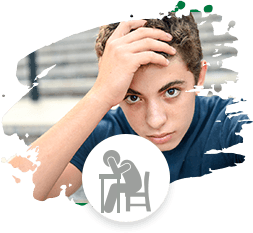 Depression & Mood Disorders
Depression & Mood Disorders 

Mood Disorders are a category of mental illnesses that involve a significant change in mood. Although the average age of onset is 30, mood disorders can affect people of any age, including children and the elderly. Listed below are categories of the same mood disorders; however it is important to note mood disorders can have a variable clinical profile and diversity. Symptoms listed below are general in nature are a guide to introduce and educate patients of various mood disorders but a full clinical evaluation and close follow up are needed frequently in child psychiatry to understand the nature of a mood disorder better.
Depression can describe a normal human emotion, but those with clinical depression have a cluster of symptoms that can last all day and can persist for at least two weeks and cause difficulty in everyday life. Children can and do experience depression, though it may present differently than it can in adults.
Symptoms can include:
- Loss of interest in daily activities
- Sense of hopelessness
- Low self esteem
- Overall feelings of inadequacy, feelings of being misunderstood
- Irritability, clinginess, worry, tearfulness, guilt, or excessive anger
- Avoidance of social activities
- Refusal to go to school
- Loss of appetite or overeating, often with weight change
- Changes in sleeping habits
- Poor concentration and lack of productivity, or drop in school grades
- Recurring thoughts of death or suicide or self harm
- Unexplained physical problems, such as headaches or pain
Dysthymia is a mild, but chronic, form of depression that often lasts longer than two years. Biochemical, genetic, and environmental factors may all play a part in causing dysthymia.
Symptoms include:
- Loss of interest in daily activities
- Sense of hopelessness
- Overly critical
- Low self esteem
- Overall feelings of inadequacy
- Irritability or excessive anger
- Avoidance of social activities
- Loss of appetite or overeating
- Sleep problems
- Difficulty making decisions
- Poor concentration and lack of productivity
Bipolar Disorder
Bipolar disorder is a mental disorder that causes major changes in a person’s mood, energy, thinking, and behavior. Those with bipolar disorder often have periods of mania (feeling very happy or "up") followed by periods of depression (feeling very sad or "down"). Children do commonly go through normal emotional ups and downs, but bipolar disorder is different. Symptoms are strong, and can make it difficult for children to do well in school and form relationships with family and friends. The causes of bipolar disorder are not clearly understood, but it appears to have a genetic component along with environmental and lifestyle factors that play a large role in the severity of symptoms. Sleep deprivation, substance abuse, and attempted self harm can significantly complicate the disorder.
Symptoms of mania include:
- Extreme happiness
- Acting silly in manner that is unusual for them or age inappropriate
- Unrealistic heights of self esteem
- Surge in energy
- Increase in talking
- Risk taking, including taking sexual risks
- Distractibility
- Short temper
Symptoms of depression include:
- Having little or no interest in fun activities
- Decrease energy levels, listlessness
- Boredom
- Changes in appetite or eating habits
- Thoughts of death or suicide
- Complaints of physical illnesses
- Social isolation
- Sleeping too much or too little





























